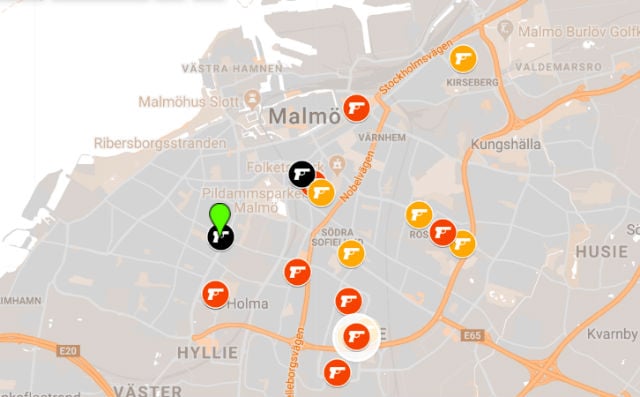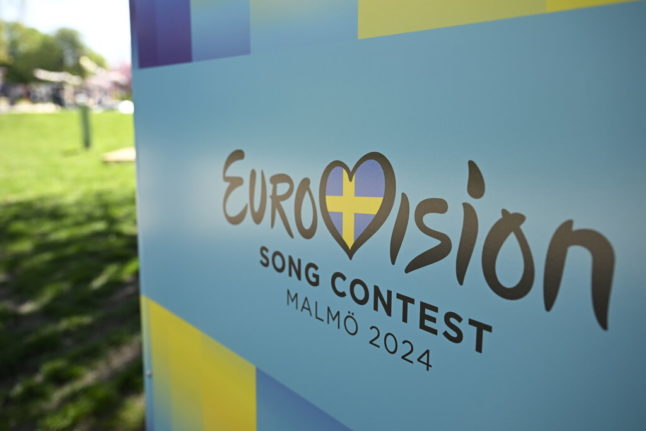After an alarming wave of deadly shootings in Malmö in 2017, police have struggled to get the bottom of the nine gun murders which took place between the start of 2017 and February 2018. In six cases, two thirds of the total, they are no longer actively investigating.
But according to Mattias Sigfridsson, Deputy Commissioner of Malmö Police, since then the force has seen a marked improvement in its success rate.
“These murders within criminal groups are hard investigations,” Sigfridsson told The Local. “We always say if we can solve half of them, we should be very pleased and right now it looks like we are doing that.”
Sigfridsson argued that the sheer number of deadly shootings over recent years has forced local police investigators to hone their skills.
According to statistics released last week, 2017 saw 65 shootings in the Malmö area in which seven people died and 35 were injured. In 2018, there were 47 shootings, 12 deaths and 14 injuries, and in the first six months of 2019 there were 13 shootings, two deaths and four injuries.
“We have improved our investigation skills in these murders, because we’ve had some training. We have improved our working on the forensic and digital evidence, and I think also in the early hours of the investigations we have improved,” Sigfridsson said.
“I think it’s a combination of good knowledge of the groups in Malmö, and improved investigative skills.”
The map below shows the locations of the fatal shootings that took place in Malmö between 2017 and 2019.
On the map, yellow shows those which took place in 2017, orange shows the 2018 shootings and the black symbol is used for those that took place in the first six months of 2019.
Click on the locations for information about the date and circumstances of the shooting, as well as an update on the police investigation.
Lindängsplan case
In mid-July the trial will begin for the 20-year-old man from Stockholm suspected of gunning down a 24-year old man with known gang links on Lindängsplan on June 21st 2018.
“We have the man on trial on what we think is good evidence,” Sigfridsson said. “We have forensic traces, I think his DNA both on the murder weapon and on the motorcycle used in the murder, so I think we have a good case.” The verdict is expected later in July.
Hålsjögatan and Hyllievångsgatan killings
Sigfridsson expects the suspected shooter in a murder that took place this June on Hålsjögatan in the upmarket Bellevuevägen district to go to trial, together with two others, by the end of this year or early next year.
“We have three guys in detention and we're working very hard on that case,” he said.
One of the three men was held for the shooting in Hyllievångsgatan on May 19th, 2018, but later released, and police are investigating and planning to prosecute the two cases together.
“It’s the same perpetrator in both of them, and the victims in those two killings are brothers,” said Sigfridsson.
Nydala killing
One person has already been sentenced to life in prison for shooting a man in Nydala, but his three suspected accomplices were released. The prosecutor appealed the judgement and the three men will go to trial in July.
“The main witness is the one who survived the shooting, so we have the surviving victim who actually told his story,” Sigfridsson said.
The witness accuses the three men of luring him and the man who died to the place where the shooting took place.
“Exactly why they did it, I’m not sure even they know because they are formerly friends and that’s why he came to these meetings,” Sigfridsson said. “You can trust no one. The loyalty changed in these groups.”
Triple shooting at Galaxy Cyber Café
Sigfridsson said the investigation was still continuing into what was perhaps 2018's most high profile case, the fatal shooting of three men at the Galaxy Cyber Café in Värnhem, just a few hundred metres from the police headquarters.
“We have a pretty good idea of the guys who helped the murderers and right now we keep on working closer to the guys who really did it,” he said.
A group of young men from Lund were detained and then released.
“We have a lot of information and we have a picture of how this crime happened, but there are some pieces of the puzzle we need to get to have enough evidence to take it trial,” he said.
Part of the problem was that because the shooter shot indiscriminately into the café, it was difficult to ascertain who was the target.
“It’s too early to say definitively what the motive was and who was the main target,” he said. “Six guys were hit so it's very hard to say that the three victims were the ones that were supposed to be killed.”
Von Rosens Väg and Docentgatan cases
The police have made progress on the the shooting on Von Rosens Väg in Rosengård on July 16th, 2018, with a man arrested in Stockholm on suspicion of being the perpetrator, and another man arrested on suspicion of ordering the killing.
Sigfridsson said he hoped the case would come to court sometime this year, perhaps in “late summer”.
He believes progress is still being made into the shooting of a well-known criminal in his 20s in Docentgatan last September, but he concedes the prosecutor is less optimistic.
Mollevången Square shooting
The toughest recent case, Sigfridsson said, was the shooting of a suspected criminal kingpin outside a kindergarten near Möllevången Square.
“It was a person who knew he lived under threat and he has himself been on trial for murders, so this was not unexpected,” Sigfridsson said. “Even though it happened in daytime with a lot of people out, we have no good witnesses who have seen the face of the perpetrator, and we don't have any forensics.”
He added that it had been hard for police to narrow down a list of likely suspects.
“Since he was the person he was he was involved in many conflicts, it’s not easy to say which of these conflicts led to this crime. I’m not so hopeful about this case as I am with the others.”
“We could give one case all the priority, and work with all our best investigators and still not solve it,” he explained. “To say we need to be lucky is perhaps to use the wrong words, but there have to be some leads to follow.”



 Please whitelist us to continue reading.
Please whitelist us to continue reading.
Member comments